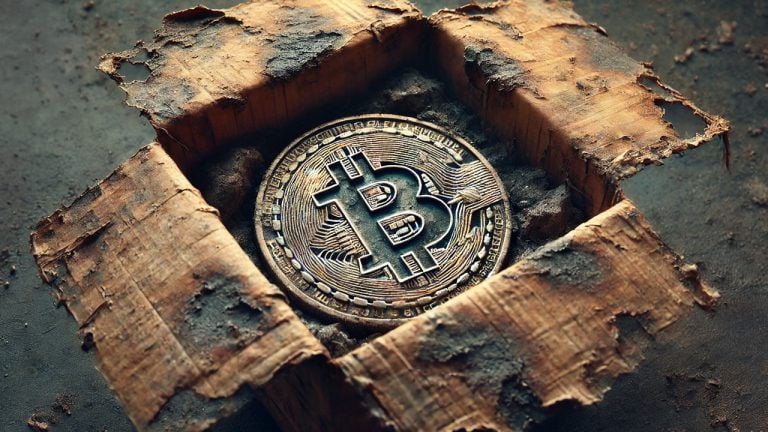 Two days ago, a dormant bitcoin wallet moved over 1,000 bitcoins on July 5, and since then, two more notable awakenings have occurred in the past 48 hours. On Saturday, an address created in December 2013 spent approximately 149.99 BTC for the first time in over a decade. On Sunday, another historic wallet from April […]
Two days ago, a dormant bitcoin wallet moved over 1,000 bitcoins on July 5, and since then, two more notable awakenings have occurred in the past 48 hours. On Saturday, an address created in December 2013 spent approximately 149.99 BTC for the first time in over a decade. On Sunday, another historic wallet from April […] On Friday, July 5, 2024, at 8 p.m. EDT, as bitcoin’s price hovered around $56,500 per unit, a dormant wallet, created on Nov. 24, 2013, transferred over 1,000 BTC, valued at $56.5 million, at block height 850,855. Long-Inactive Bitcoin Wallet Transfers Over $56M At 8 p.m., or Bitcoin block height 850,855, a wallet created ten […]
On Friday, July 5, 2024, at 8 p.m. EDT, as bitcoin’s price hovered around $56,500 per unit, a dormant wallet, created on Nov. 24, 2013, transferred over 1,000 BTC, valued at $56.5 million, at block height 850,855. Long-Inactive Bitcoin Wallet Transfers Over $56M At 8 p.m., or Bitcoin block height 850,855, a wallet created ten […]
Over 25,000 students in El Salvador have learned about Bitcoin in the classroom.
El Salvadorian school kids as young as 12 years old are being orange-pilled — taught to send their first Bitcoin (BTC) transaction by visiting members of El Salvador’s Bitcoin Beach.
Bitcoin Beach community leader Roman Martínez told Cointelegraph that he believes early-age education on Bitcoin, money and the economy may lay out a framework for many of the underprivileged kids he teaches to have a better shot at life.
Martínez explained Bitcoin Beach runs after-school programs to help set kids up to use Bitcoin.
“Every Friday we visit schools for Bitcoin education where we talk about money and dreams, we teach them to set up a Bitcoin wallet, we help them receive their first satoshi and make transactions.”
A satoshi, or sat, is the smallest denomination of Bitcoin, with 100 million sats making up one BTC.

Martínez noted that students have embraced the technology, despite many first having the impression that Bitcoin was hard to learn or only for those studying economics.
“Once [they’re] willing to learn it is so easy,” he added.
He explained Bitcoin Beach places a strong emphasis on teaching students about Bitcoin, money and banking because these subjects are largely not taught in schools.
“No one teaches you about money. We do transactions every day, we work for money, we save money, but no one teaches us about it. If you want to make a change, people and families need to learn about money.”
Martínez believes Bitcoin is the “latest evolution of money,” and by teaching kids about the benefits of Bitcoin — in combination with other life skills — they’ll be able to seek better employment opportunities.
“If they know English, have computer skills, know about Bitcoin and know about marketing, they can work remotely for anyone around the world,” he explained. “This is a big door that is open now for everyone.”
The future looks better! #God #surf #Bitcoin #Surfparatodos @Bitcoinbeach pic.twitter.com/sGpQtuyRsg
— Roman Martínez⚡️ (chimbera) (@romanmartinezc) July 22, 2023
According to its whitepaper, Bitcoin Beach is a movement to ensure Bitcoin’s potential is realized by helping those who have been excluded from the banking system.
It’s based in El Zonte — a beach town around an hour’s drive southwest of the nation’s capital, San Salvador, and one of the first areas in the country to start accepting Bitcoin.
Related: How crypto can be used in classrooms — and deliver financial literacy
Another Bitcoin education nonprofit based in El Salvador is My First Bitcoin, which has helped 25,000 students obtain a “Bitcoin Diploma” through the country’s public school system.
New Video Out Now!
— Max DeMarco ⚡️ (@itsmaxdemarco) August 15, 2023
25,000 students have been educated about #bitcoin in El Salvador.
I visited @MyfirstBitcoin_ to find out how they plan to change the world.
Full #ElSalvador Video Below pic.twitter.com/CL5bVgxH8K
Around 70% of El Salvadorians are currently unbanked. Financial inclusion has been a core focus for pro-Bitcoin President Nayib Bukele, who currently boasts one of the highest presidential approval rates in the world, according to some reports.
Many of the Bitcoin-related programs were kickstarted by the El Salvadoran government’s world-first move to make Bitcoin legal tender in the country in September 2021.
Collect this article as an NFT to preserve this moment in history and show your support for independent journalism in the crypto space.
Magazine: Should you ‘orange pill’ children? The case for Bitcoin kids books